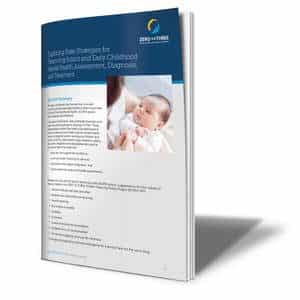This article summarizes key themes from Oregon’s role in a convening of states and jurisdictions centered around improving state policies supporting Infant and Early Childhood Mental Health assessment, diagnosis, and treatment.
 Children’s earliest experiences impact their brain formation and in turn, their social and emotional, physical, cognitive, communication, and sensory and motor skills development. Recognizing the tremendous opportunities and risks associated with this critical time, states are increasingly investing in promoting infant and early childhood mental health (IECMH), defined as the capacity of a child from birth to age five to experience, express and regulate emotions; form close, secure interpersonal relationships; and explore his/her environment and learn, all within the context of family and cultural expectations. ZERO TO THREE released two papers in 2018 and 2019 highlighting strategies states are employing to support children’s IECMH. Highlights from Oregon include:
Children’s earliest experiences impact their brain formation and in turn, their social and emotional, physical, cognitive, communication, and sensory and motor skills development. Recognizing the tremendous opportunities and risks associated with this critical time, states are increasingly investing in promoting infant and early childhood mental health (IECMH), defined as the capacity of a child from birth to age five to experience, express and regulate emotions; form close, secure interpersonal relationships; and explore his/her environment and learn, all within the context of family and cultural expectations. ZERO TO THREE released two papers in 2018 and 2019 highlighting strategies states are employing to support children’s IECMH. Highlights from Oregon include:
- In a section discussing the importance of collecting data to demonstrate the cost effectiveness of IECMH services, Oregon’s work to collect data on Parent-Child Interaction Therapy (PCIT) is described. State staff review every treatment record and provide feedback. Data is used for fidelity reviews and to influence broader goals of the agency. The data indicates that 85 percent of families that participate in four or more sessions show improvement. While this is promising, state staff refrain from saying PCIT will save money because they do not have the data to make that claim. Instead, when asked about the cost, they refer to an article published on the cost-benefit of the PCIT intervention.
- In a section describing how states are promoting the use of DC:0-5™ (a diagnostic classification of mental health and developmental disorders of infancy and early childhood published by ZERO TO THREE), Oregon is highlighted for developing a crosswalk between DC:0-5, DSM, and ICD-10 to make it easier for clinicians to bill Medicaid. They added information specific to Oregon’s Medicaid plan, posted the crosswalk on the official Oregon Health Authority website and created companion documents outlining how and why it should be used. They also developed PowerPoint presentations of different lengths and detail to introduce the crosswalk to varied audiences. Presentations have been given around the state to clinician groups, Medicaid managed care organizations, early learning hubs, and other stakeholders.
- In a section focused on maximizing reimbursement through the Medicaid Early and Periodic Screening, Diagnostic and Treatment (EPSDT) benefit, Oregon is highlighted because the state’s Medicaid policy codes abuse and neglect as a primary diagnosis, and therefore all children in the child welfare system are eligible for behavioral health services. Parent-child relational problems are now a primary diagnosis, too, as well as other stressors to the primary support group. Leaders were successful in making the case that social determinants of health (e.g., homelessness, substance abuse) are stressors on the primary support group and therefore should qualify the parent and child for services.
Learn more about how Oregon and other states are promoting IECMH in Advancing Infant and Early Childhood Mental Health: The Integration of DC:0–5™ Into State Policy and Systems and Exploring State Strategies for Financing Infant and Early Childhood Mental Health Assessment, Diagnosis, and Treatment.
Oregon is one of twenty states and jurisdictions participating in ZERO TO THREE’s IECMH Financing Policy Project that supports states in improving IECMH policy and practice, with a focus on financing.




